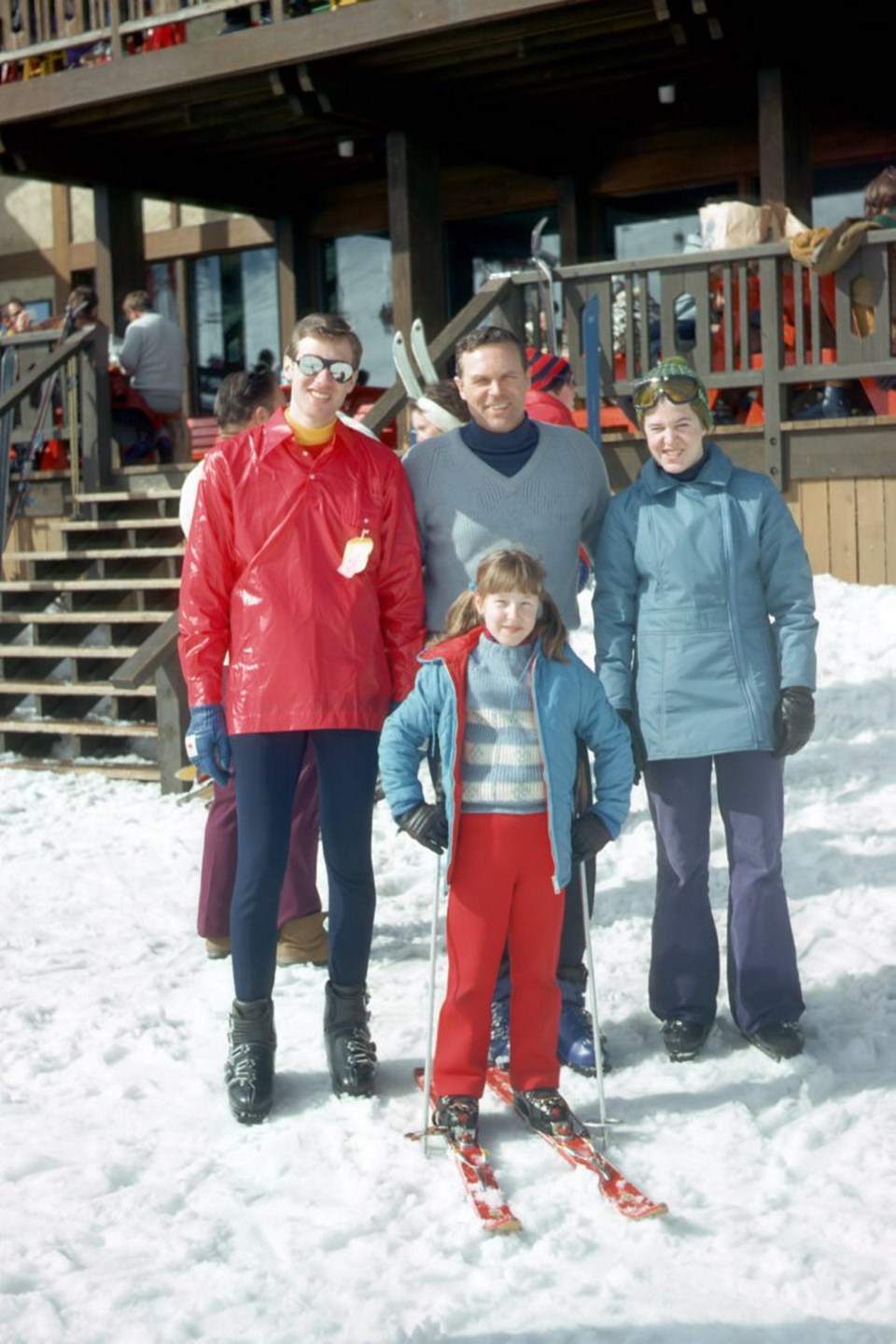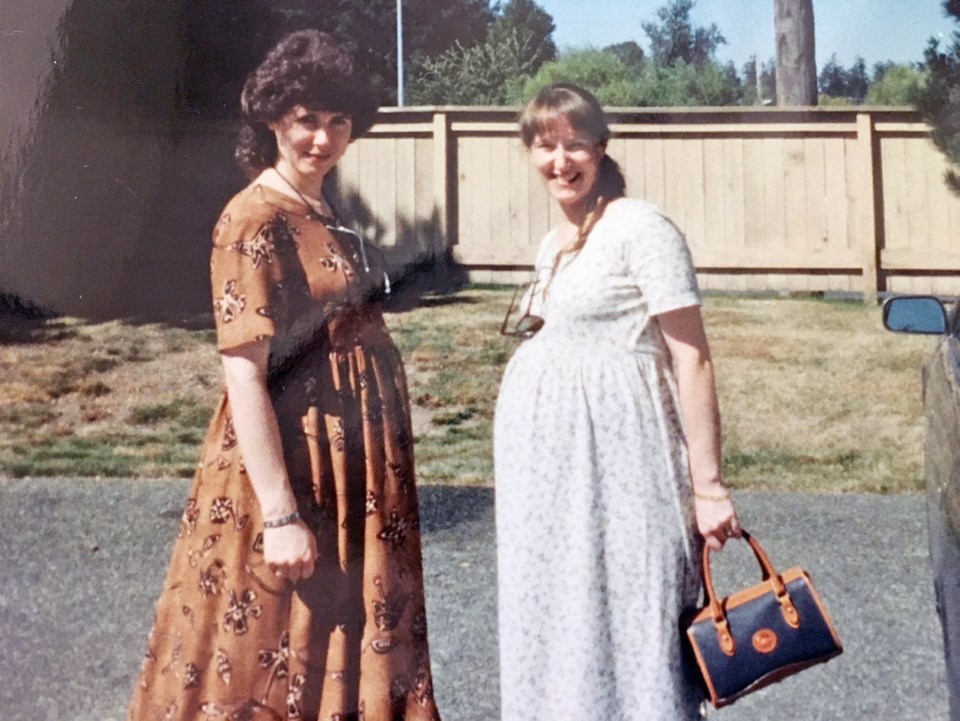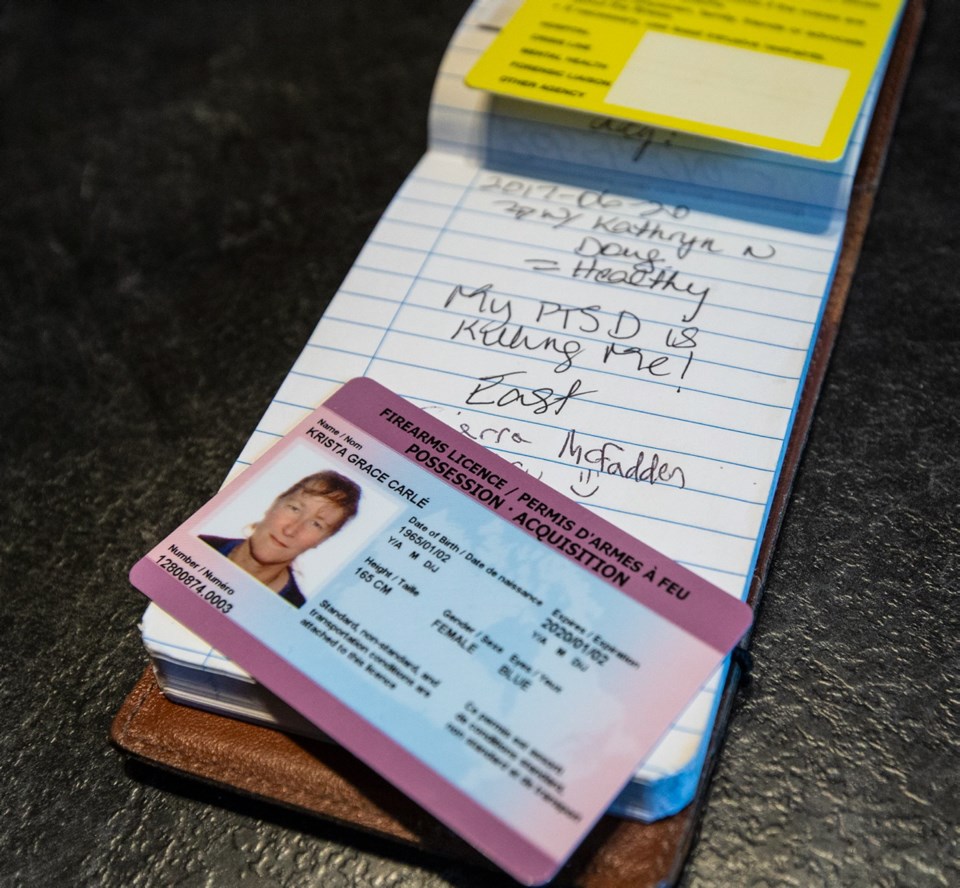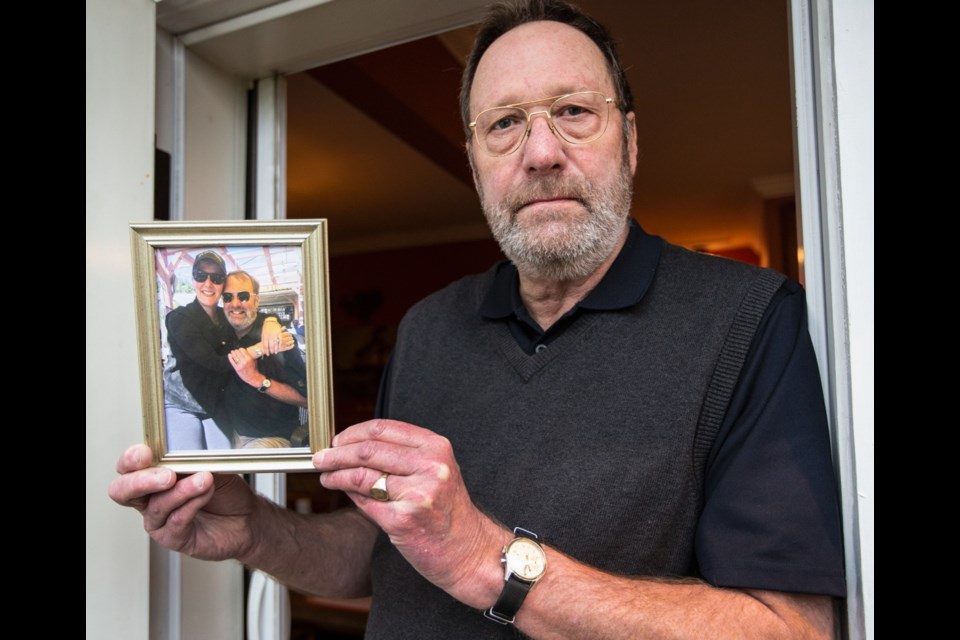In the spring of 2018, Kevin Carlé received a phone call from the Sooke RCMP that haunts him to this day. An officer was making inquiries into whether Carlé’s sister, former Nanaimo Mountie Krista Carlé, should have her gun returned.
Sooke RCMP had seized her firearms licence and handgun in February 2017, after she was seen in public acting strangely and carrying a gun.
The officer on the phone asked Kevin if there was any reason not to return Krista’s firearm.
“I remember being a little bit speechless and I didn’t really know why,” the retired naval captain said in an interview. “I thought it was just a tiny check in a whole list of extensive checks that would have been done. I assumed they contacted her psychiatrist. But I don’t know. I hope so.”
Kevin told the officer that his sister hadn’t been well, but appeared to be recovering.
“She was a bit like her old self. We assumed she was on her meds and on her path to wellness. But I’m not a medical expert and I’m not really in a position to say yay or nay,” he told the officer.
Today, he wishes he’d said: “No bloody way.”
On July 6, 2018, at the age of 53, Krista Carlé took her own life using the .22-calibre pistol that had been returned to her a month earlier.
> Part 1: She got her gun back, then she killed herself
Now her older brother is left with questions about the process that allowed her to get her gun back. Krista had been one of the first women to speak out about sexual misconduct in the RCMP — she was sexually assaulted by a fellow RCMP officer and endured years of abuse on the force, resulting in a diagnosis of PTSD.
Today, Kevin wonders if he could have said anything to that officer that would have made a difference.
“It really haunted me. It really caused me to be concerned,” said Kevin, 64. “The more I thought about that phone call, the more I believed it was really inappropriate of them, unprofessional, for them to ask me about this, because it puts me in an awkward position, doesn’t it? And I don’t have anything to contribute to the process other than love for my sister.”
Kevin believes family members are not qualified to comment on whether someone should be in possession of a firearm.
“I don’t know if it’s part of their standard procedure or not. If it is, I’m not so sure it’s the right thing.”
Kevin still remembers the day his baby sister, Krista Grace, came into the world.
It was Jan. 2, 1965, a cold and snowy day in Calgary.
The family was heading off to go skiing in Banff when their very pregnant mother, June, came down the stairs and told them they would have to rethink their day a little.
“I can still see Mum waddling to the car with the skis still strapped on the back,” Kevin said with a smile.
The baby girl who came home a few days later was cute as a button, he recalled. And Krista grew into a happy-go-lucky kid. Kevin said he and his older sisters doted on Krista, so much so that his mother told them they had to let Krista find her own words and finish her sentences.
“I still remember her sitting in her high chair, trying to get a word in edgewise.”

Krista was friendly and outgoing.
When the family moved to CFB Moosejaw, then North Bay and Tacoma, Washington, she took it all in stride.
“She always seemed to adapt,” said Kevin.
Krista and Kevin were particularly close, despite the 10-year age gap. By the age of eight, she had become an automobile enthusiast like her older brother. She loved being taken for drives in his MG sports car, or driving up Mount Rainier in his Volkswagen.
“It was something we definitely had in common,” he said.
Krista’s first major loss was the death of her father when she was 14. Michael Carlé was a Canadian Air Force pilot and instructor.
“He was a terrific man, a terrific father and he died far too young of a brain tumour at age 50,” said Carlé.
Krista found her voice in high school and was not shy about sharing her opinions around the family dinner table. After high school, she completed a degree in theatre and fine arts at the University of Victoria.
Krista’s decision to become an RCMP officer was inspired by her family’s legacy of service. Her grandfather, James, had been a river pilot on the Yangtze River. When he moved the family from Shanghai to Victoria, he joined the navy. He met his wife, Ethel, during the First World War, when she was nursing in China.
“Krista thought the RCMP would be the way to carry on that legacy,” Kevin said. “It was a place where she felt she could help people more than in the military. Undercover work intrigued her. I think she fundamentally wanted to help people be safe and she thought the RCMP was a worthy, iconic institution.”
Her brother has fond memories of the day Krista graduated from the RCMP Academy, Depot Division in Regina in July 1991. She was a confident, lovely, vivacious woman who had surpassed the challenges of basic training, he said.
“It was tough, tough for women, and she persevered. Krista wasn’t big physically, but she got through and we were all proud,” said Kevin, who attended the ceremony with his mother, sister Karen and his aunt and uncle.
The ceremony was even more memorable because Lt.-Cmdr. Kevin Carlé, in his white naval uniform, was asked to accompany the commanding officer to inspect the graduating troop on parade.
“It was pretty impressive,” said Kevin. “The RCMP was really good at welcoming extended families into the force. We saw the facilities, the beautiful old chapel, then Krista went off into the sunset to her first posting in Strathmore, Alta.”
No one could have predicted that 19 years later, she would write: “My PTSD is killing me” in her RCMP notebook.
The harassment started when she was a new recruit. In drill class, she and troopmates Catherine Galliford, one of the first Mounties to speak out about her experiences at the hands of fellow officers, and Janet Merlo, the lead plaintiff in a class-action lawsuit against the force, were forced to repeat: “What was the worst year for the RCMP? 1974 — the year they allowed women into the RCMP.”
At her first posting, an explicit pornographic image of a woman performing oral sex on a man was photocopied and placed in all her investigation files in her briefcase, desk drawers and training manual. Pornographic photos were placed in her desk drawer and under her blotter.
Krista endured jokes about menstruation. One officer had pictures of strippers on his desk, which she quickly removed before a group of young school children came into the station for a tour.
Her supervisor asked her who she was “boinking.” One officer repeatedly jabbed her in the ribs between the folds of her bulletproof vest and placed a hot spoon against her hand every day when they had coffee, even though she repeatedly told him to stop.
Krista constantly overheard male officers make demeaning, sexist comments about women in the office and the size of their breasts. Krista was told she was “dumb as a sack of nails.”
When she returned to work after her second maternity leave, she was told she “was a waste of skin.” In 1993, she was forcibly kissed by a co-worker.
In March 1994, when she was working undercover, Krista was sexually assaulted by Sgt. Robert Blundell. He grabbed her breast and put his hands down her pants. She felt she couldn’t say anything because it would blow the operation.
Kevin Carlé said he was in touch with his sister, but had no idea of some of what she was going through. “She was one of four women who sued the RCMP after being assaulted by Blundell. She didn’t really want to talk about it. She had signed a non-disclosure agreement. I became aware that she spiralled down a little bit. It was really sad.”
In the fall of 2016, RCMP Commissioner Bob Paulson issued an apology to current and former women officers who had been subjected to bullying and harassment. The apology coincided with an announcement that the federal government had agreed to earmark $100 million to settle two class-action lawsuits by women officers who alleged they had been discriminated against based on gender or sexual orientation.
Krista submitted her complaint to the class-action sexual-misconduct settlement, known as the Merlo Davidson Settlement, outlining 23 incidents between September 1991 and 2010.
At that point, however, she had already retired early, in 2009, because of mental-health issues. She attributed her problems to the stress she suffered from ongoing sexual harassment.
Still, Krista, who was proud of her almost 20 years of service, remained hopeful and optimistic for the RCMP, Kevin said. He does not feel the same way. “I am so angry about how the RCMP has repeatedly seemed to get away with bad behaviour unchecked.”
Krista’s older sister, Karen, and Karen’s husband, John Harper, got to know a lot of police officers when Krista “began her mental-health journey.” Karen, a nurse, was worried because she knew there were guns in the home Krista shared with her partner.
“And in mental-health situations, you see people are shot because they are wielding a knife,” she said.
Karen brought photos of a healthier, happier Krista to the Sooke detachment and showed them to RCMP Staff Sgt. Jeff McArthur. She wrote down that Krista was a daughter, a sister, a mother and a recipient of the Queen’s Jubilee medal, “so that the other RCMP members would know who Krista was before this.”
McArthur’s dealings with her younger sister still bring tears to Karen’s eyes.
“He was just so awesome to John and me and Krista. I’m teary just thinking about it.”

She remembers a Krista who was more a friend than a sister. She admired Krista’s knowledge of politics and her laughing, outgoing personality. They worked at Eaton’s together. They travelled together. The two young women graduated at the same time and became pregnant at the same time, having their first children six weeks apart.
“She wasn’t my annoying baby sister anymore. We started going through life together.”
In the beginning, Krista loved her job with the RCMP, upholding their values and connecting with people, said Karen.
“I visited her in Calgary and seeing her dressed up to go to work was pretty impressive.”
But today, Karen doesn’t know how Krista put up with the ongoing abuse. And she wants to feel confident that police officers who come to answer her call don’t have to deal with bullying and harassment at work.
“Janet Merlo, Catherine Galliford and Krista were amazing, strong individuals and [the harassment] brought them down to people you wouldn’t recognize,” she said.
Karen said she’s still not OK after everything that’s happened.
“Life is just different now. I miss my baby sister.”
In November, Central Saanich police Cpl. Brent Robertson contacted Kevin Carlé to talk about the way Krista died.
Kevin was already reeling from a decision that denied Krista’s children compensation from the Merlo Davidson Settlement.
Krista had submitted her claim on time, but the organization overseeing the settlement failed to review it before she took her own life. The settlement only allows compensation for living officers. Her children, now 19 and 21, will not get a cent.
Kevin has called the decision by Michel Bastarache, the Ottawa-based independent assessor who is administering the settlement claims, “shockingly cruel and insensitive.” He has appealed to the government to compensate Krista’s two children, but the request was rejected.
More recently, Kevin met with all three local members of Parliament — Elizabeth May, Randall Garrison and Laurel Collins — and found support in his quest for justice for his sister’s family.
Randall Garrison, the new NDP justice critic, knew Krista and was very upset her estate was denied compensation, said Kevin. Garrison told Kevin he would write a letter to the justice minister and have it hand-delivered in the House of Commons.
“They haven’t got anyone else to pass it off to. They have to sit there and read it,” Kevin recalled Garrison saying.
Elizabeth May wrote to the ministers of Justice, Public Safety and Veterans Affairs and had her letters hand-delivered in the House of Commons.
“I would like the government to right this wrong and ensure Krista’s legacy and reputation is not questioned,” Kevin said. “It’s another injustice against Krista. She experienced injustice while serving in the RCMP, various injustices after she left the RCMP and now, in death, her family is experiencing injustice.”
The late-November conversation with Robertson was a bit of a bombshell, said Kevin.
Robertson told Kevin that in July 2018, he was working as a firearms officer, seconded to the RCMP National Weapons Enforcement Support Team, when he learned more about Krista’s case. He discovered that between Feb. 27 and July 19, 2017, the police had been called to deal with Krista’s mental-health issues 24 times. Sooke RCMP officers had seized her gun and firearms licence Feb. 27, after being called to her home, where they became concerned for her safety.
She asked for it back in June of 2018. On July 6, 2018, Krista killed herself.
Robertson told Carlé that he tried to find out what information the Chief Firearms Officer had relied on to reinstate Krista’s licence, but was told the office would not be releasing any information. Later that day, Robertson said he was warned that if he continued to investigate, “he could be arrested for obstruction.”
When Robertson told Kevin that Krista would never have been given a firearms licence if she was applying for one today, Kevin gasped.
“That’s powerful stuff.”

In November, a frustrated and disillusioned Robertson filed a five-page complaint with the Civilian Review and Complaints Commission for the RCMP. The complaint alleges that Sooke RCMP failed to conduct a proper review and threat assessment on Krista before they returned her restricted firearm.
His complaint is being investigated by a senior official based in Saskatchewan.
Kevin said he was shocked when he read Robertson’s claim and realized how the officer had been treated.
“He has put his reputation on the line and been badly treated for just going about the duties we as citizens and taxpayers would want him to do.”
Kevin said his sister’s death needs to be investigated. Like Robertson, he believes the Chief Firearms Officer returned Krista’s licence without all the information.
“If a firearms licence is seized, the process to return it should be rigorous. This is something that should be looked into. This is all about public safety and proper procedures being followed — or not,” said Kevin.
“The fact is, public confidence in the RCMP has been shaken. They walk around with lethal force strapped to their hips. They are there for the public good and order, and if a standard procedure was significantly departed from, that’s not right and it may happen again.”
In Vancouver, senior media relations officer Staff Sgt. Janelle Shoihet said the B.C. RCMP initiated an internal review of the events relating to Krista Carlé’s death. That review is nearing completion and has resulted in a number of recommendations, many of which have already been implemented.
“While we cannot share publicly the results of this review, we are committed to providing all relevant information to support the public complaint investigation,” she said in an email.
Kevin wants to be briefed on the review and find out what recommendations have been implemented in the wake of his sister’s suicide.
“I think it would help us heal,” he said. “There’s no doubt about it. Her death was directly related to RCMP malfeasance and leadership failures. Her death was directly a result of her service in the RCMP and the many incidents of dreadful behaviour that she suffered, including sexual assault.”
Being forced to request a copy of the review under the Freedom of Information Act is “entirely insulting and would not be fair and appropriate,” he said.



